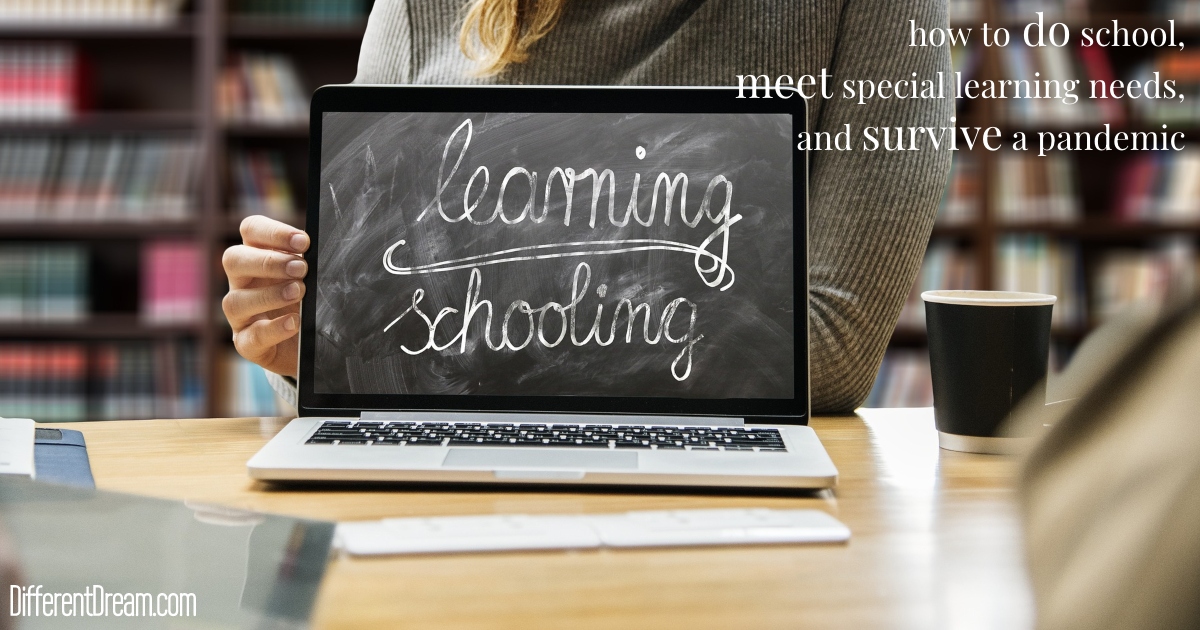School Options for Special Needs Students in 2020-21

School options for special needs students have to be examined and addressed as the pandemic continues. Guest blogger Marnie Witters describes school options for special needs students that have worked for her family.
In March of 2020, our high school sons went from attending a brick and mortar school with friends and teachers to writing essays at our kitchen table, exercising in our family room, and fixing their own lunches. As the pandemic drags on, parents of special needs students have to look at the pros and cons of both digital and in-person offerings to see which is a better fit for their children with Individual Education Plans (IEPs). This post highlights a few school options for special needs families like ours. Hopefully, they will help you navigate through the 2020-21 school year.
Virtual School
For families who are at high-risk or have medically fragile children, online learning can be a life saver. I recently became a writing teacher for a new virtual school in the Atlanta area. I have researched schools for more than 10 years and have never found one quite like The Academy Virtual. It offers a multi-sensory curriculum for children with dyslexia, processing disorders, ADHD, ASD, typical students who had a bad experience in school, and children with various learning challenges. All classes are taught 100% online with structured literacy, math, writing, and phonics for students in grades 3-6. The school’s goal is to encourage students so they know how amazing, unique, and smart they are.
Public School
Because of our sons’ needs, we’ve done public school (in-person and virtual), private school, and homeschool. Each option has its pros and cons and each served a specific purpose at certain times in our sons’ lives.
This year our oldest, who is 16, is doing public school digital learning. He started the year in a smaller, private in-person school, but felt like he was missing something. He said he missed his friends, likes online learning, and wants to learn software coding. His school offers support with his IEP. He has speech therapy again and can connect with friends.
Private School
For families seeking smaller class sizes, a Christian curriculum, and less distractions, private schools might be a good fit. Some offer online courses for digital learners. Socializing and interacting with others is important for these students, which an in-person option can provide. Tangible locations like classrooms, cafeterias, and media centers are familiar and what students associate learning with, so learning and interacting might come easier for these types of students. Private schools are not bound to individual education plans (IEP’s), so parents should verify if the school can support their child.
Homeschool
Homeschool is a great option for families looking to cater the curriculum to their child’s specific needs and learning style. Homeschool offerings have expanded over the past 10 years. There are homeschool co-ops for every class and every grade. Choosing curriculum can be overwhelming because there are so many offerings including digital ones.
Homeschooling offers the flexibility to be mobile and learn anywhere. We took our classroom to the park, on vacation, and to their grandparents’ house. Our boys received the one-on-one, individualized teaching they needed when they were younger. It’s why they’ve grown in their faith and can advocate for themselves. My oldest cooks and my youngest cleans–life skills can be a huge part of homeschool curriculum.
While navigating 2020 and the school options for special needs students, try to remember to seek the Lord, to stop and breathe, to be with family, to create new traditions, and to be grateful.
Because, as my late pop used to say, “This too shall pass.”
Do you like what you see at DifferentDream.com? You can receive more great content by subscribing to the quarterly Different Dream newsletter and signing up for the daily RSS feed delivered to your email inbox. You can sign up for the first in the pop up box and the second at the bottom of this page.

By Marnie Witters
Marnie Witters was a technical writer and editor for more than 20 years until she resigned to homeschool her sons when they were young. When they went back to public school, she began to write. Recently she began teaching writing for a virtual school in the Atlanta, Georgia area. She’s been married for 20 years, serves in an amazing church, loves to garden, and enjoys spending time with her family.
Related Posts
Managing Mixed Emotions When Our Kids with Disabilities Go Back to School
Guest blogger Kristin Faith Evans offers tips for managing mixed emotions when our kids with disabilities go back to school.
How Much Is Too Much to Tell Teachers about my Child’s Disability?
Guest blogger and teacher Maggi Gale asks, “How much is too much to tell teachers about my child’s disability?”
Parenting in Light of Neurodiversity
Guest blogger Lisa Pelissier explains some communications tips she’s learned while parenting and homeschooling her autistic son.






0 Comments